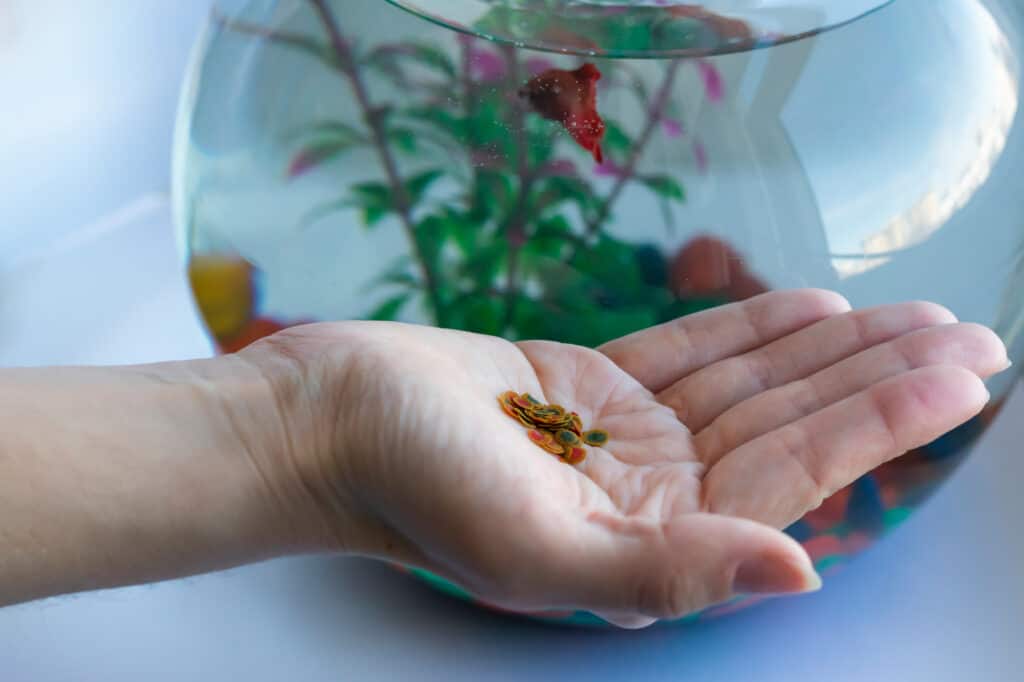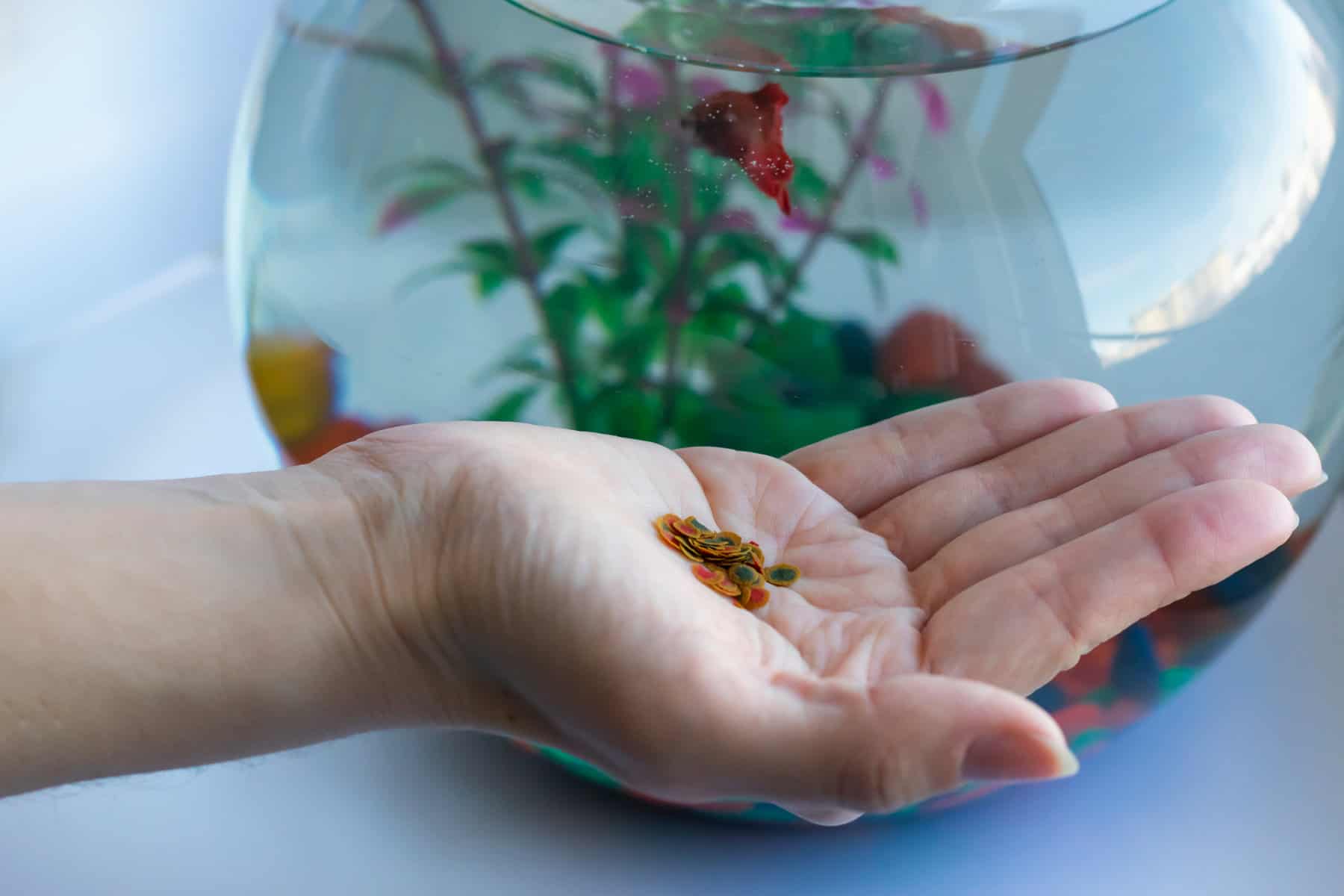There are many different types of fish foods to choose from, including tropical flakes, which can confuse betta fish owners. Now, your betta buddy is a tropical fish, so you would assume that he can eat tropical flakes.
But is that so? Can betta fish eat tropical flakes? Is it safe? And do betta fish even like tropical flakes?
Read this guide to learn whether your betta fish can eat tropical flakes.
What Are Tropical Flakes?
Tropical fish flakes are formulated to deliver a highly-digestible, palatable balanced feed. Basically, tropical flakes are designed to be complete pet food for fish.
Although the formulation of fish flakes varies between brands, most tropical flakes contain all the key nutritional ingredients that tropical fish need to thrive, including algae, essential vitamins, and minerals.
Some tropical flakes even include natural pigments that promote beautiful coloration in your fish and probiotics for excellent digestive health.
Can Betta Fish Eat Tropical Flakes?
So, can betta fish eat tropical flakes?
Well, the answer to that question is both yes and no, depending on your betta buddy’s constitution and personal taste!
Most bettas will eat whatever you put in their tank, although some are much pickier and need tempting. However, bettas are primarily carnivorous. In the wild environment, bettas feed on insect larvae, water-bound insects, small crustaceans, algae, and some plant matter.
Tropical fish flakes contain mostly plant-based proteins and fillers, such as soy and wheat. So, many tropical flakes are relatively low in protein, which doesn’t suit a betta fish’s nutritional needs.
Bloated Betta!
Betta fish can be prone to digestive tract problems, including constipation and bloating, and feeding your betta a diet of primarily dried foods, such as tropical flakes, often causes those health issues.
What Foods Are Best for Betta Fish?
Your betta’s diet should be primarily meat-based, with a small amount of plant matter.
We generally recommend offering your betta pet commercial food, such as betta mini pellets, as a basic diet. Betta pellets are specially formulated for the nutritional needs of betta fish while catering to their sensitive digestion.
Mini betta pellets are also the perfect size for your betta’s tiny mouth. Betta fish have upturned mouths that are designed for surface feeding, so betta pellets are designed to float on the water surface.
In addition to pellets, you should include the following in your betta’s diet:
Bloodworms
Bloodworms are also sometimes called tubifex worms. These tiny red worms are actually midge larvae that live in poorly oxygenated water.
Although you can buy bloodworms as live food in some pet stores, we recommend that you feed your betta frozen or freeze-dried bloodworms. Live foods often come with an unwanted cargo of parasites and bacteria that could make your betta buddy sick.
If you opt to feed your betta freeze-dried bloodworms, we recommend that you soak a few worms in some tank water before feeding them to your pet. Freeze-dried food swells when rehydrated and can cause constipation in betta fish.
Frozen foods should be thawed in tank water before you offer them to your betta.
Brine Shrimp
Brine shrimp are tiny freshwater crustaceans that are a favorite of betta fish. Brine shrimp are rich in both minerals and healthy omega-3 fatty acids, making them an excellent addition to your betta’s diet.
Brine shrimp are a popular frozen food for bettas, or you could have a go at raising them yourself in a home brine shrimp hatchery.
Mosquito Larvae
Mosquito larvae are available to betta fish in the wild environment, so your pet will appreciate the addition of these critters to his captive diet.
Feed your betta frozen mosquito larvae rather than the live version.
How Often To Feed Your Betta
Feed your betta once or twice a day, offering only what your pet will consume in a couple of minutes.
Give your pet some meaty foods several times a week to keep his digestive tract functioning properly, and allow some algae to grow in the tank for your betta to graze on between meals.
Fasting Days
It’s a good idea to allow one day per week when your betta doesn’t have any food at all.
In the wild, bettas often don’t eat every day, depending on the availability of suitable food sources in their immediate habitat.
That opportunistic feeding habit helps to keep the betta’s digestive tract functioning correctly. So, wild betta fish rarely succumb to bloating or constipation, as they often do in captivity.
That means you don’t need to panic if you run out of food for your betta pet; a day or two without food won’t harm your pet!
Betta Mini Pellets vs. Tropical Flakes
Although your betta most likely would eat tropical flakes if they contained enough meaty proteins, flakes often cause digestive problems in bettas. Flakes also sink quite quickly, leading to more waste, as bettas are primarily surface feeders.
Betta floating mini pellets are a much better choice.
When choosing dried fish food for your betta pet, keep the following tips in mind:
- Since bettas are carnivorous, the first few ingredients in the food should be fish, invertebrates, or other seafood.
- Avoid food containing fish meals. Fish meal is basically the leftover, non-nutritious parts of fish that are ground up to create a kind of paste or “meal.”
- High-quality, nutritious food contains around 40% crude protein content.
- Too much fat content and fiber can disrupt bettas’ digestion. So, look for a food that contains 5 to 10% crude fat and less than 10% crude fiber.
- Ideally, the food should contain Omega-3 or Omega-6 fatty acids.
- Avoid foods that contain artificial colors, preservatives, or flavor enhancers.
- Natural ingredients and color enhancement nutrients can make your betta’s colors more vibrant.
- The list of ingredients should include plenty of different types of ingredients.
On balance, we recommend feeding your betta fish foods that are specifically formulated for bettas. That said, you could give your pet some tropical flake food in a pinch. Remember to crush the flakes into tiny pieces so that your fish can eat them.
Varied Nutrition for Bettas
Betta fish do best when fed a varied, balanced diet.
My betta pet did extremely well when fed a portion of betta mini floating pellets once a day, together with a couple of frozen bloodworms or some frozen daphnia as a second feed later in the day.
One day a week should be a fasting day when you don’t feed your fish anything at all.
Leave a small number of algae growing in an area of the tank that can’t be seen so as not to spoil the look of your setup. Your betta will enjoy grazing on the algae between feeds, which also helps replicate your pet’s wild diet.
How Do I Feed My Betta Fish?
Feed your adult betta fish only what he will eat in a couple of minutes.
Many bettas are greedy creatures with huge appetites that will happily gobble up whatever you put in their tank.
There’s nothing wrong with having a healthy appetite; however, overfeeding often results in digestive problems for your betta, and any uneaten food will sink to the bottom of the tank, where it gradually decomposes, giving off ammonia and polluting the water.
Final Thoughts
So yes, betta fish can eat tropical flakes. However, that’s not the best choice of diet for your pet.
Ideally, you should feed your betta buddy a varied diet of mini floating betta pellets, frozen foods, and some rehydrated, freeze-dried bloodworms.
Include one day per week when your betta doesn’t receive any food at all. That gives your pet’s digestive system a chance to process everything your betta has eaten in a previous couple of days before he adds more food to the digestive queue.
If you enjoyed our guide to feeding bettas tropical fish flakes, please take a moment to share the article before you go!

